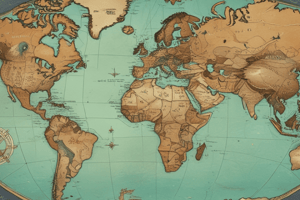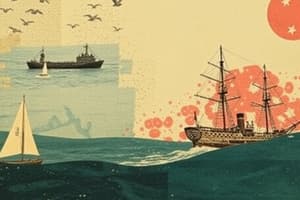Podcast
Questions and Answers
The International Convention for the ______ of Pollution from Ships aims to prevent pollution of the marine environment from ships.
The International Convention for the ______ of Pollution from Ships aims to prevent pollution of the marine environment from ships.
Prevention
The International Convention on ______ Lines establishes minimum freeboard requirements for ships to ensure their safety and stability under various conditions.
The International Convention on ______ Lines establishes minimum freeboard requirements for ships to ensure their safety and stability under various conditions.
Load
The International Convention for the ______ and Management of Ships' Ballast Water and Sediments aims to prevent the spread of harmful aquatic organisms and pathogens.
The International Convention for the ______ and Management of Ships' Ballast Water and Sediments aims to prevent the spread of harmful aquatic organisms and pathogens.
Control
The International Convention on Civil Liability for ______ Pollution Damage establishes a liability and compensation regime for oil pollution damage caused by tankers.
The International Convention on Civil Liability for ______ Pollution Damage establishes a liability and compensation regime for oil pollution damage caused by tankers.
The International Convention on the ______ of Harmful Anti-fouling Systems on Ships regulates the use of anti-fouling systems on ships to prevent the release of harmful substances.
The International Convention on the ______ of Harmful Anti-fouling Systems on Ships regulates the use of anti-fouling systems on ships to prevent the release of harmful substances.
The ______ Convention establishes procedures for the provision of assistance to persons in distress at sea, regardless of nationality or status.
The ______ Convention establishes procedures for the provision of assistance to persons in distress at sea, regardless of nationality or status.
MARPOL includes ______ covering different types of pollution and sets out requirements for ship design, equipment, and operational practices.
MARPOL includes ______ covering different types of pollution and sets out requirements for ship design, equipment, and operational practices.
The BWM Convention requires ships to manage their ______ water to minimize the transfer of invasive species.
The BWM Convention requires ships to manage their ______ water to minimize the transfer of invasive species.
The CLC Convention ensures that victims of ______ pollution incidents receive prompt and adequate compensation.
The CLC Convention ensures that victims of ______ pollution incidents receive prompt and adequate compensation.
The AFS Convention regulates the use of ______ systems on ships to prevent the release of harmful substances into the marine environment.
The AFS Convention regulates the use of ______ systems on ships to prevent the release of harmful substances into the marine environment.
Flashcards
UNCLOS
UNCLOS
A comprehensive treaty adopted in 1982, governing all aspects of ocean space, including navigation, resource management, and environmental protection.
Territorial Sea (UNCLOS)
Territorial Sea (UNCLOS)
The zone extending up to 12 nautical miles from a coastal state's baseline, where the state has sovereignty.
Exclusive Economic Zone (EEZ)
Exclusive Economic Zone (EEZ)
A zone extending up to 200 nautical miles from the baseline, where a coastal state has rights for exploration and resource exploitation.
Contiguous Zone (UNCLOS)
Contiguous Zone (UNCLOS)
Signup and view all the flashcards
Transit Passage (UNCLOS)
Transit Passage (UNCLOS)
Signup and view all the flashcards
International Convention on Load Lines
International Convention on Load Lines
Signup and view all the flashcards
General Obligations (Load Lines)
General Obligations (Load Lines)
Signup and view all the flashcards
Surveys and Certificates (Load Lines)
Surveys and Certificates (Load Lines)
Signup and view all the flashcards
International Maritime Organization (IMO)
International Maritime Organization (IMO)
Signup and view all the flashcards
SOLAS Convention
SOLAS Convention
Signup and view all the flashcards
Study Notes
United Nations Convention on the Law of the Sea (UNCLOS)
- Adopted in 1982, UNCLOS is a comprehensive treaty regulating all oceanic aspects.
- Comprises 320 articles and nine annexes addressing territorial waters, exclusive economic zones, navigation, marine environment, scientific research, and dispute resolution.
Key Articles of UNCLOS
- Territorial Sea (Article 3): Coastal states can establish a territorial sea extending up to 12 nautical miles from the baseline.
- Exclusive Economic Zone (Article 56): Coastal states have rights and jurisdiction in zones extending up to 200 nautical miles for exploration and resource exploitation.
- Contiguous Zone (Article 33): Extends up to 24 nautical miles from the baseline, allowing limited coastal state control over customs, immigration, and pollution.
- Straits Used for International Navigation (Article 37): Guarantees ships and aircraft the right of transit and innocent passage through international straits.
- Archipelagic States (Article 46): Defines rights and duties for states comprised of groups of islands, including baseline drawing and passage rights.
- High Seas (Article 86): Establishes freedoms of navigation, fishing, overflight, and scientific research in international waters.
- Marine Pollution (Article 194): Obligates states to prevent and control marine pollution and to collaborate during pollution incidents.
- Settlement of Disputes (Article 287): Outlines mechanisms for dispute resolution, including negotiation, arbitration, and judicial settlement via ITLOS.
International Convention on Load Lines
- First adopted in 1966, aimed at ensuring ship safety through regulation of minimum freeboard based on ship dimensions and operational context.
- 1996 Amendments: Entered into force in 2003, consisting of 16 articles addressing safety and compliance.
Key Articles of International Convention on Load Lines
- General Obligations (Article 1): States must ensure compliance with convention provisions for ships flying their flag.
- Application (Article 2): Identifies ship types and sizes that must adhere to load line regulations.
- Exemptions (Article 3): Allows certain exemptions for ships operating under specific conditions.
- Surveys and Certificates (Article 4): Mandates compliance verification through surveys and issuance of load line certificates.
- Marking of Deck Line (Article 5): Specifies marking requirements for indicating assigned freeboard on ships.
- Timber Freeboards (Article 6): Establishes special provisions for ships with timber freeboards.
- Reduced Freeboards (Article 7): Details additional safety requirements for ships assigned reduced freeboards.
- Equivalents (Article 8): Accepts alternative arrangements meeting safety equivalence to convention standards.
- Control Procedures (Article 9): Requires states to establish control procedures for enforcement of load line regulations.
- Casualties (Article 10): Obliges investigation and reporting of maritime casualties to prevent future occurrences.
International Maritime Organization (IMO)
- Responsible for creating and upholding maritime regulations and conventions addressing safety, security, and environmental protection.
Key IMO Conventions
- International Convention for the Safety of Life at Sea (SOLAS): Sets minimum safety standards for ship construction, equipment, and operation, including fire safety and lifesaving devices.
- International Convention on Standards of Training, Certification and Watchkeeping for Seafarers (STCW): Establishes training and certification standards to ensure seafarer competence.
- International Convention on Maritime Search and Rescue (SAR): Creates a framework for conducting international search and rescue operations at sea.
Studying That Suits You
Use AI to generate personalized quizzes and flashcards to suit your learning preferences.



